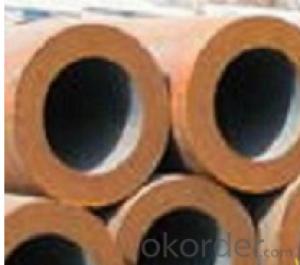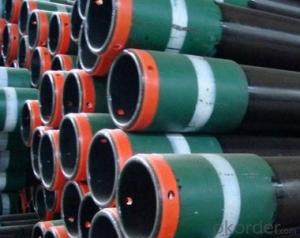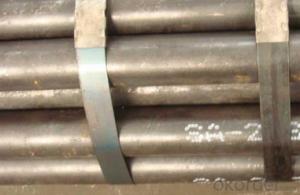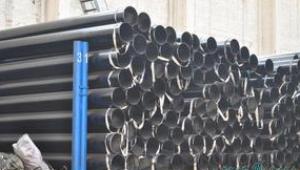Schedule 40 ASTM A53 API 5L GR.B Carbon Seamless Steel Tubes STPG370 CNBM
- Loading Port:
- Qingdao
- Payment Terms:
- TT OR LC
- Min Order Qty:
- 10 pc
- Supply Capability:
- 30 pc/month
OKorder Service Pledge
OKorder Financial Service
You Might Also Like
Quick Details
| Thickness: | 2.0 - 85 mm | Section Shape: | Round | Outer Diameter: | 17 - 914.4 mm |
| Secondary Or Not: | Non-secondary | Application: | Oil Pipe | ||
| Technique: | Hot Rolled | Certification: | API | Surface Treatment: | VARNISH PAITING |
| Special Pipe: | API Pipe | Alloy Or Not: | Non-alloy | END: | PLAIN,BEVELED OR THREADED |
| Grade: | 10#,20#,16Mn,A106(B,C),A210,A335 P5,A335 P91,A53(A,B),API J55,API K55,Q195,Q235,Q345,St37,St52,10#-45#,A53-A369,API J55-API P110,Q195-Q345,ST35-ST52 | Standard: | API 5CT,API 5L,ASME B36.19M-2004,ASTM A106-2006,ASTM A179-1990,ASTM A182-2001,ASTM A53-2007,BS 1387,DIN 1629/3,DIN EN 10216-1-2004,GB 5310-1995,GB/T 3091-2001,GB/T 8162-1999,GB/T 8163-1999,JIS G3454-2007,API,ASTM,BS,DIN,GB,JIS |
Packaging & Delivery
| Packaging Detail: | standard packing suitable shipping by sea.fixed length as customers' requirements, or SRL or DRL. Varnish, painting or galvanized, or FBE ,2PE,3PE 3pp coating,bevelled/plain/threaded ends with caps, packing in bundle (OD smaller than 141.3mm) big sizes packing in loose, marking as required. Shipped by sea,by air,by train . or some samples shipped by DHL,EMS,TNT,FEDEX ect. Length shorter than 5.85m should be shipped by 20' container, 5.85-12m shipped by 40' container. |
| Delivery Detail: | 7-35 days after advance payment |
Product Description
Seamless steel pipes, a large number of used pipes conveying fluids, such as transport oil, natural gas, gas, water pipes and some solid materials, and so on. Compared to other steel and solid steel bar, the same torsional strength in bending, lighter, is an economic cross-section steel, widely used in the manufacture of structural parts and mechanical parts, such as drill pipe, automotive drive shafts, bicycle rack and construction using steel scaffolding ring with steel pipe manufacturing parts, can improve material utilization, simplify the manufacturing process, saving material and machining time, such as bearing rings, jack sets, has been widely used to manufacture steel. Steel or a variety of conventional weapons indispensable material, gun barrels to make steel. Steel shapes in different cross-sectional area can be divided into tube and shaped tubes. As in the perimeter of equal conditions, the largest area of a circle with a circular tube can carry more fluid. In addition, the circular cross section to withstand internal or external radial pressure, the force is uniform, so the vast majority of the pipe is pipe.
- Q:How are steel pipes used in the construction of water supply systems?
- Steel pipes are commonly used in the construction of water supply systems due to their durability, strength, and resistance to corrosion. They are used for transporting water from sources such as reservoirs and wells to treatment plants, and then distributing it to homes, buildings, and other structures. Steel pipes are also used for transporting wastewater and sewage. Their ability to withstand high pressure and extreme weather conditions makes them ideal for ensuring a reliable and long-lasting water supply infrastructure.
- Q:How are steel pipes tested for quality control?
- Steel pipes are tested for quality control through various methods such as visual inspection, non-destructive testing, and physical testing. Visual inspection involves checking the pipes for any visible defects or inconsistencies in their appearance. Non-destructive testing methods like ultrasonic testing, magnetic particle testing, and radiographic testing are used to detect internal flaws or defects without damaging the pipes. Additionally, physical tests like tensile and impact testing are performed to evaluate the mechanical properties of the pipes. These comprehensive testing techniques ensure that steel pipes meet the required quality standards before they are used in various applications.
- Q:How are steel pipes used in the manufacturing of marine applications?
- Steel pipes are commonly used in the manufacturing of marine applications due to their durability, strength, and resistance to corrosion. They play a crucial role in various applications such as shipbuilding, offshore platforms, and underwater pipelines. Steel pipes are used to transport fluids, gases, and oils, as well as for structural support and protection against harsh marine environments. Additionally, steel pipes are also utilized in the construction of marine heat exchangers and cooling systems.
- Q:How are steel pipes used in hydroelectric power plants?
- Steel pipes are used in hydroelectric power plants to transport water from the reservoir to the turbines. These pipes are designed to withstand high pressure and are often used for penstocks, which are large vertical pipes that deliver water to the turbines at a controlled rate. The durability and strength of steel pipes make them ideal for withstanding the force of the flowing water and ensuring a reliable water supply for power generation.
- Q:What are the different types of steel pipe elbows?
- There are various industries and applications that commonly utilize different types of steel pipe elbows. These types encompass: 1. 90-degree elbows: Employed when redirecting fluid or gas flow requires a sharp 90-degree bend. They find extensive use in plumbing, construction, and industrial piping systems. 2. 45-degree elbows: Similar to 90-degree elbows, these elbows alter flow direction, but with a smaller angle. They are suitable for situations requiring a more gradual change in flow direction. 3. Long radius elbows: Differing from standard elbows, long radius elbows possess a larger curvature radius. This design minimizes fluid friction and pressure drop, making them ideal for applications necessitating smoother flow, such as high-flow systems or those involving viscous fluids. 4. Short radius elbows: In contrast, short radius elbows feature a smaller curvature radius. They are generally utilized in confined spaces where a compact design is essential, although they may lead to increased fluid friction and higher pressure drops. 5. Reducing elbows: These elbows are ideal for connecting pipes of varying diameters. With one end having a larger diameter and the other end with a smaller diameter, they enable a seamless transition between two pipes of different sizes. 6. Mitered elbows: Mitered elbows are tailor-made elbows fabricated by cutting and welding multiple pipe sections at specific angles. They are frequently employed when standard elbows cannot accommodate the required angle or when a unique design is necessary. In conclusion, the selection of the appropriate type of steel pipe elbow depends on factors such as the specific application, fluid flow requirements, space limitations, and compatibility with the piping system.
- Q:Can steel pipes be used for water supply lines?
- Yes, steel pipes can be used for water supply lines. Steel pipes are durable and have high tensile strength, making them suitable for carrying water. However, it is important to ensure that the steel pipes are properly treated to prevent corrosion and rusting.
- Q:How are steel pipes used in the manufacturing of agricultural machinery?
- Steel pipes are commonly used in the manufacturing of agricultural machinery as they are strong, durable, and resistant to corrosion. They are used to create the framework and structural components of various agricultural equipment such as plows, tillers, planters, and harvesters. Steel pipes provide stability and strength to these machines, allowing them to withstand heavy loads and operate efficiently in tough farming conditions.
- Q:What is the weight of hot galvanized steel tubes? DN150 4mm wall thickness
- GB/T3091-2008: DN150 welded steel pipe, wall thickness of 6mm, the theory of the weight of welded steel pipe 24.02kg/m, galvanized steel pipe should be multiplied by the weight coefficient after galvanizing, C, DN150, wall thickness of 6mm, C=1.02, DN150, theoretical weight and wall thickness of 6mm galvanized steel 1.02*24.02= 24.5kg/m.
- Q:What are the advantages of using steel pipes in industrial plants?
- Using steel pipes in industrial plants offers numerous advantages. Firstly, their exceptional strength and durability make them ideal for transporting materials and fluids under high temperatures, pressures, and heavy loads. Secondly, steel pipes have excellent resistance to corrosion, which is crucial in industrial settings where they encounter corrosive substances or harsh environmental conditions. This resistance ensures their longevity, prevents leaks, and eliminates potential hazards. Additionally, steel pipes are highly versatile. They can be easily fabricated and customized to meet specific requirements, including different sizes and shapes. This flexibility simplifies installation and maintenance, reducing downtime and improving overall efficiency. Moreover, steel pipes have a smooth interior surface, allowing for efficient material flow with minimal resistance and pressure drop. Their smoothness also prevents the accumulation of deposits and contaminants, ensuring a clean and hygienic environment. Furthermore, steel pipes exhibit high resistance to fire, providing an added layer of safety in industrial plants where fires can have disastrous consequences. Lastly, while the initial installation cost of steel pipes may be higher compared to other materials like plastic or copper, their durability and low maintenance requirements result in significant long-term cost savings. With a long lifespan and resistance to corrosion and damage, the need for frequent replacements or repairs is minimized. In conclusion, the use of steel pipes in industrial plants offers various advantages, including strength, durability, corrosion resistance, versatility, efficient flow, fire resistance, and cost-effectiveness. These qualities make steel pipes a reliable and efficient choice for diverse applications within industrial facilities.
- Q:Can steel pipes be used for oil wells?
- Yes, steel pipes can be used for oil wells. Steel pipes are commonly used in the oil and gas industry due to their strength, durability, and resistance to corrosion. They are able to withstand the high pressures and temperatures that are encountered in oil well drilling and production. Steel pipes are also able to transport oil efficiently and safely from the well to the surface, making them a preferred choice for oil well infrastructure. Additionally, steel pipes can be easily welded and threaded, allowing for easy installation and maintenance in oil well applications.
1. Manufacturer Overview |
|
|---|---|
| Location | |
| Year Established | |
| Annual Output Value | |
| Main Markets | |
| Company Certifications | |
2. Manufacturer Certificates |
|
|---|---|
| a) Certification Name | |
| Range | |
| Reference | |
| Validity Period | |
3. Manufacturer Capability |
|
|---|---|
| a)Trade Capacity | |
| Nearest Port | |
| Export Percentage | |
| No.of Employees in Trade Department | |
| Language Spoken: | |
| b)Factory Information | |
| Factory Size: | |
| No. of Production Lines | |
| Contract Manufacturing | |
| Product Price Range | |
Send your message to us
Schedule 40 ASTM A53 API 5L GR.B Carbon Seamless Steel Tubes STPG370 CNBM
- Loading Port:
- Qingdao
- Payment Terms:
- TT OR LC
- Min Order Qty:
- 10 pc
- Supply Capability:
- 30 pc/month
OKorder Service Pledge
OKorder Financial Service
Similar products
New products
Hot products
Related keywords































